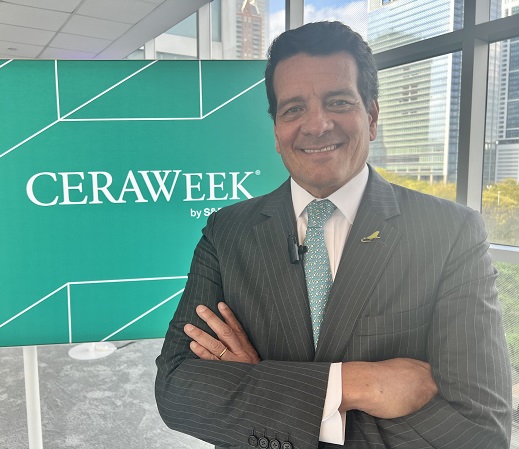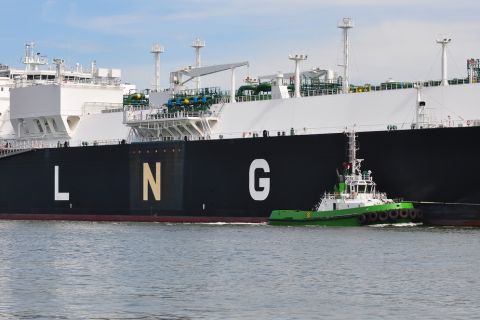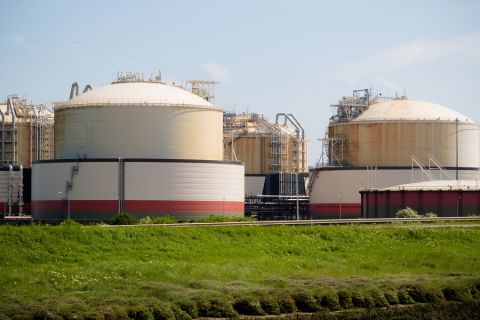Ecopetrol CEO Felipe Bayon spoke with Pietro D. Pitts, Hart Energy’s international managing editor, at CERAWeek by S&P Global to discuss the advances the state-owned company has made under his leadership. Bayon, who steps down from his position on March 31, remains optimistic about the company’s joint venture with Occidental Petroleum in the Permian Basin. He’s equally excited about recent gas discoveries offshore Colombia and the company’s ability to gradually boost reserves. On March 7, Bayon spoke in Houston against a backdrop of uncertainty in Colombia amid the start of new President Gustavo Petro’s administration. Petro has spoken openly against fracking.

Pietro D. Pitts: You’ve told me before that Ecopetrol has a drilling inventory of about 10 years, should the new government ban new exploration. Is that still the case?
Felipe Bayon: It's still the case and there're a couple of things that are worth mentioning. First, we've just announced the best results ever in the history of Ecopetrol. Production is rising and on average closed the year at 709,500 boe/d. In December, we had 735,000 boe/d and the good news is it's back to pre-pandemic levels. The fields are working well despite a few issues here and there because of civil unrest in some fields that have had to be shut down. But things are good from a production point of view.
Refining, it's actually running very well. We started the expansion of the Cartagena refinery last year [and] went from 150,000 to 200,000 bbl/d of capacity, which is very timely with the country actually having higher demand than what we previously had.
If you look at exploration, we had seven discoveries. We're still evaluating some of the wells that we started drilling late last year, and two of those were the large discoveries in the offshore, Uchuva and Gorgon.
RELATED
Ecopetrol Eyes Double-digit Permian Production Growth in 2023
Over the last five years, we've invested $400 million in innovation, technology, and research. The benefits that we've been able to certify only in the last two years are close to $1 billion, so it's paying off. And last year we had the safest ever year … from a personnel and process safety perspective.
So if you look at the different bits and pieces, it's running well. Why is this relevant? Because we're building on from that base, which is quite solid. This year capex will reach $5.6 billion [to] $6 billion, an increase from last year, and it includes $1 billion for [transmission company] ISA [Interconexion Electrica SA]. But if you look at our ability to execute, to actually deploy capital, it's improved significantly over the years.
Having said that, back to your point, that uncertainty. All in all, I think there's some aspects for some variables that you say could create uncertainty. Longer-term, I do agree with you, and a lot of investors talk to us and they partner with us or they invest in us and they say, ‘look what's going to happen? What's the outlook?’ We have ten years out in terms of exploration opportunities. We're shooting more seismic, close to 2,000 km this year, which is a lot compared to what we were doing earlier. And then we're reprocessing at least 5 to 10 times (onshore and offshore) more depending on the year. The good thing about this is that we can go back and look at the data with new technology and new capabilities, more processing speed, and we find more stuff. And if you're thinking about infrastructure, net exploration or near field exploration, this is very helpful.
I firmly believe that the conversation around all the new contracts and the possibility of granting new contracts needs to remain open. It's a conversation that is responsible with the country that needs to be based on data and facts, and it has to be based on one principle that I believe is quite relevant, which is energy sovereignty. The war in Ukraine has taught us that we're fragile. And as much as you can, you want to ensure that you have your own energy to consume and you don’t want to rely on third parties for that.
PDP: Is Colombia at risk of moving the transition too fast if it stops exploration and doesn’t properly use fossil fuel revenues to finance that transition?
FB: Five or six years ago, we had 6.3 years of oil reserves and today we have 8.3 years. So, we've managed to increase two years to [the] life of [our] reserves, which is good. It's not 20 years, but in today's world, …[would] you want to be anywhere above 10 or 12 years? Probably not. Our gas reserves have gone down from almost 12 years to 8.8 years [but] the thing with gas is that we’ve had 1P discoveries, but then in contingent resources, we have things like Gorgon. It's a matter of time and work to move those into the reserve and production category. Then in the discovered reserves yet to be appraised, we have things like Uchuva.
Back to your point, I do believe, and it's a conversation we've had over the last two days here in Houston at CERAWeek, is 'what's the right pace to do a transition that's orderly?' And at the end of the day, you want to ensure that you continue to provide energy to our people, it’s one of the most powerful ways of closing gaps overall. And it could be … electricity, gas, diesel, gasoline, jet fuel, you name it. The most costly energy is what you don't have. So Colombia is now sufficient on gas as we've made discoveries. We've pledged three or four years ago to be a gassier company and we're showing that we're on track. We still need to do quite a few things to deliver, but that's going on. We are self-sufficient in diesel and gasoline, and we need to import some things.
I'm a firm believer that we're advancing quite well in terms of the transition. So [we’ve moved on] geothermal, solar, wind, hydrogen, CCUS [carbon capture, utilization and sequestration], you name it and there's quite a big advance after the purchase of ISA. But if we go too quickly, we have the risk or we run the risk of creating such a cost for people that it's unbearable.
PDP: After the Gorgon and Uchuva finds, you talked about the potential creation of new offshore province, and Ecopetrol still has the four offshore blocks with Occidental. So how much potential are we talking about?
FB: From a prospect point of view we're talking about 75 to 100 Tcf of gas, reserves today are 3 Tcf. This is massive, almost 35 times the gas reserves that we have here, or if converted to an oil equivalent, that would be 16 billion barrels. Some of those resources need to be de-risked and that's going to take some time. If you think about oil specifically, I think it's going to be required in the world for the next 20 to 30 years at least. The debate is whether the world is going to be using 105 MMbbl/d or 100 MMbbl/d or 95 MMbbl/d? So, where is that going to come from? So how do we ensure Ecopetrol continues to be very efficient, to be a reliable source of good quality crudes for ourselves and for our customers?
We have made a good progress in terms of decarbonizing our operations. Again, the enemy is not the source of energy. The enemy is the emissions. And that's something we need to tackle further. I do believe there's enough potential to ensure that Colombia continues to be self-sufficient. And why not, we could even think about being a regional hub and exporting [with this reserve potential].
PDP: What’s the timeframe for initial volumes to flow?
FB: I hope to see molecules in 2026 from some of these discoveries, then some other volumes in 2028-2030. The two wells we drilled last year that confirmed discoveries and opened up the possibility of seven offshore wells. This is something that we hadn't seen before in the history of the country.
PDP: Ecopetrol is on track to again achieve double-digit production in the Permian, is that correct?
FB: Remember, in November 2019 there were zero barrels and no production. Last year production averaged 37,800 boe/d and in December we had 57,400 boe/d. We have more than 200 wells and some increases in reserves, which is brilliant. We made an additional deal and we’re not only in the Midland, we’re in Delaware as well. It’s a bit of high grading and the most important thing is that production is going up, reserves are going up. Additionally, the Permian barrels have less than eight kilograms of CO2/bbl. Some experts say the industry average is 50-60 kilograms of CO2/bbl, so this is on the low end of the range. And a lifting cost is below $4/bbl. Last year alone, it gave us $644 million of EBITDA. So, it's a safe, healthy, environmentally-friendly business. And we love our partner Oxy. We learn from them, we trust and respect each other, and the partnership has demonstrated that it's working well.
PDP: How much of an increase will we see this year in the Permian?
FB: It's really going to average between 50,000-55,000 boe/d in 2023. Additionally, our operations in the Gulf of Mexico will add another 10,000 boe/d. So it's increasing and we're always looking at opportunities to make operations safer. We have a lot of people in the operation, which gives us a lot of know-how and technology and knowledge transfer. So, I'm very enthused.
PDP: Are you only looking to grow organically or by other means?
FB: We're always looking and accessing opportunities as oil and gas companies do.
PDP: Are you still looking to get into the transmission business here in the U.S.?
FB: The answer is yes. We've had one geography that we really like, because we do believe there's opportunity, especially with the [Inflation Reduction Act] right now. The U.S. … I think it's committed to two actually very large investments in terms of not only transition, but transmission. And one thing that I've said, and I'll repeat it: without transmission, there's no transition. If you cannot get the electrons from where they're being generated to where they're going to be consumed, it's going to be very tough. We've been talking to people about potential things that we can do jointly with them. Some incumbents here in the U.S. hopefully you'll hear more about.
PDP: In Colombia, there’s talk that President Petro’s government is looking to import gas from Venezuela. Is that likely to happen?
FB: Hopefully not because it's off spec. There needs to be investment in the pipeline that needs to be fixed now. But, why would you bring gas from Venezuela that is not producing jobs, taxes, royalties in Colombia if you have the potential in Colombia? It doesn't make any logic to me.
PDP: On the topic of imports, will Colombia continue to turn to LNG through its Caribbean terminal?
FB: Yeah, but that's a safety net for when you have power plants that are on maintenance and you have that need at gas-fired power plants. As a matter of fact, we're using a very small terminal, it's micro-LNG in Buenaventura. A couple of months ago, when there were blockades and unrest, Buenaventura was destined to have no gas, but by bringing in this small cryogenic LNG gas, the city of Buenaventura was able to have gas.
PDP: Guyana is an emerging powerhouse with a lot of associated gas, maybe 17 Tcf. They’ve launched a bid round offering 14 blocks offshore, has Ecopetrol considered participating?
FB: We'll be looking at it, yeah, absolutely.
Recommended Reading
NextDecade Targets Second Half of 2024 for Phase 2 FID at Rio Grande LNG
2024-03-13 - NextDecade updated its progress on Phase 1 of the Rio Grande LNG facility and said it is targeting a final investment decision on two additional trains in the second half of 2024.
Darbonne: Brownsville, We Have LNG Liftoff
2024-04-02 - The world’s attention is on the far south Texas Gulf Coast, watching Starship liftoffs while waiting for new and secure LNG supply.
Biden Administration Hits the Brake on New LNG Export Projects
2024-01-26 - As climate activists declare a win, the Department of Energy secretary says the pause is needed to update current policy.
Gunvor Group Inks Purchase Agreement with Texas LNG Brownsville
2024-03-19 - The agreement with Texas LNG Brownsville calls for a 20-year free on-board sale and purchase agreement of 0.5 million tonnes per annum of LNG for a Gunvor Group subsidiary.
Venture Global, Grain LNG Ink Deal to Provide LNG to UK
2024-02-05 - Under the agreement, Venture Global will have the ability to access 3 million tonnes per annum of LNG storage and regasification capacity at the Isle of Grain LNG terminal.






